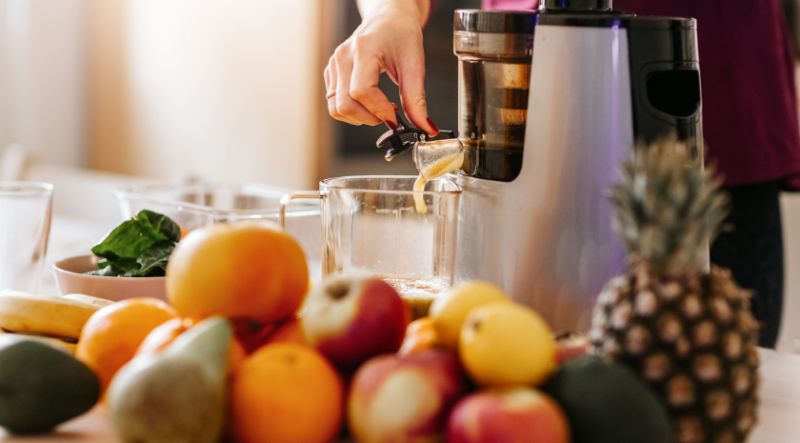When it comes to juicing, the choice between a centrifugal and masticating juicer is one of the fundamental decisions you’ll face. Both have their own set of advantages and disadvantages, making it essential to understand the differences before selecting the one that best suits your juicing needs. In this exploration of centrifugal versus masticating juicers, we’ll delve into the workings, pros, and cons of each type, helping you make an informed choice to enhance your juicing experience.
Centrifugal Versus Masticating Juicer
Centrifugal Juicer
How it works: Centrifugal juicers use a high-speed spinning blade to shred fruits and vegetables, and then the centrifugal force separates the juice from the pulp. The juice is expelled through a strainer while the pulp is collected separately.
Towards the end of this year, there is an event – the Nama juicer black friday deals. During this event, centrifugal juicers are being offered at great prices. This is the perfect opportunity for you to take advantage and purchase a juicer for your family.

Advantages:
- Speed: Centrifugal juicers are much faster than masticating juicers, making them a time-efficient choice.
- Ease of use: They are generally easier to assemble and clean, which is great for people with busy lifestyles.
Disadvantages:
- Oxidation: The high-speed spinning can introduce more oxygen into the juice, which may cause quicker oxidation and nutrient degradation.
- Less efficient: They tend to be less efficient at extracting juice from leafy greens and can be noisier during operation.
Masticating Juicer
How it works: Masticating juicers, also known as slow or cold-press juicers, use a slower rotating auger or twin gears that crush and squeeze the fruits and vegetables to extract the juice. They operate at a lower speed and generate less heat.
Advantages:
- Nutrient retention: The slow and gentle process generates less heat and minimizes oxidation, preserving more nutrients and enzymes in the juice.
- Versatility: Masticating juicers are often better at handling leafy greens, soft fruits, and even wheatgrass.
- Quieter operation: They are quieter compared to centrifugal juicers.
Disadvantages:
- Slower: Masticating juicers are slower in juicing due to their methodical extraction process.
- Complex cleaning: They can be more intricate to clean, and assembly might require a little more effort.
Which Juicer is Right for You
1. Type of Produce
If you mostly juice hard fruits and vegetables like apples and carrots, a centrifugal juicer’s speed and efficiency may suit your needs.
If you prefer leafy greens, soft fruits, and wheatgrass, a masticating juicer is a better choice due to its effectiveness with these types of produce.

2. Nutrient Retention
If preserving maximum nutrients is a top priority, masticating juicers are better at minimizing oxidation and heat during the juicing process.
3. Noise Level
Consider the noise level. Centrifugal juicers are generally noisier due to their high-speed operation, while masticating juicers operate quietly.
4. Speed and Convenience
Centrifugal juicers are faster and more convenient for quick juicing.
Masticating juicers are slower but may offer better nutrient retention and versatility.
5. Cleaning and Maintenance
Centrifugal juicers are easier to clean and assemble. Masticating juicers have more components and might require more time for cleaning.
6. Space and Budget
Consider the available space in your kitchen. Centrifugal juicers are typically more compact.
Your budget may influence your choice as masticating juicers are often more expensive.
7. Longevity
Masticating juicers tend to have longer lifespans due to their slower, less abrasive operation.
8. Shelf Life
Juice from masticating juicers may have a longer shelf life due to reduced oxidation.
Some Healthy Juice Recipes That You Can Prepare Using Both Centrifugal and Masticating Juicers
1. Green Detox Juice
- Ingredients: Kale, cucumber, celery, green apple, lemon, and ginger.
- Health Benefits: This juice is packed with antioxidants and detoxifying properties.
2. Carrot-Orange-Ginger Juice
- Ingredients: Carrots, oranges, and a small piece of ginger.
- Health Benefits: High in vitamin C, promotes healthy skin, and boosts the immune system.
3. Beet-Berry Blast
- Ingredients: Beets, strawberries, blueberries, and an apple.
- Health Benefits: Rich in antioxidants and supports heart health.
4. Cucumber-Watermelon Cooler
- Ingredients: Cucumber, watermelon, and a hint of mint.
- Health Benefits: Hydrating and refreshing, great for a hot day.
5. Citrus Carrot Juice
Ingredients: Carrots, oranges, and grapefruit.
Health Benefits: A vitamin C powerhouse that supports eye health.

6. Spinach-Apple-Kiwi Delight
- Ingredients: Spinach, apples, and kiwi.
- Health Benefits: Packed with iron and vitamin C, great for energy and immunity.
7. Pineapple-Carrot-Orange Sunrise
- Ingredients: Pineapple, carrots, and oranges.
- Health Benefits: Immunity-boosting and a great source of vitamin A and vitamin C.
8. Minty Green Juice
Ingredients: Spinach, cucumber, green apple, lemon, and fresh mint leaves.
Health Benefits: Refreshing and rich in vitamins and minerals.



